
Above the law
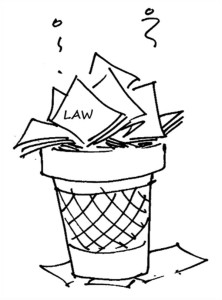
Sir,
This is with reference to Musharraf’s trial and spin doctoring by his lawyers. It is time that the people of Pakistan and its establishment understand that all paid civil and uniformed individuals, traders, politicians and institutions exist because of this country and are there to serve it, not vice versa. Every individual, irrespective of post he holds must obey laws of Pakistan and nobody is above law. Any individual if he violates the law must be held accountable and his trial only strengthens rule of law.
All that afflicts Pakistan is because the so called elite of this country consider themselves above law, and brute force is allowed to be used as a tool for political dominance. In any civilized sovereign country, those who evade taxes or rob state exchequer and plunder state assets are considered criminals and are punished. Those responsible for target killing are criminals, not politicians, nor Taliban. Such criminals should be behind bars, and never be eligible for any paid or elected public service.
The chaos and terrorism that plague Pakistan is a direct consequence of abuse of power and self-assumed immunity from accountability by the so called elite of this country.
For Pakistan to prosper and strengthen, the vision of Jinnah must prevail and there should be zero tolerance for those who abrogate the constitution, suspend it, or plunder its assets in the guise of welfare of its paid public servants.
Gull Zee,
Washington, D.C.
Hatred for Ghaznavi
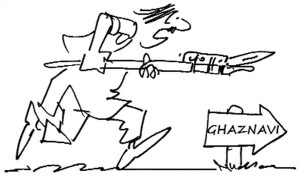
Sir,
Kunwar Khaldune Shahid has been unkind to Mahmud of Ghazni by reciting history with incorrect perspective in his article Hatred For Hindus (The Friday Times, 28th March 2014).
He says: “During his endeavour to destroy the temple (Somnath), Ghaznavi also butchered 50,000 Hindus.”
Now, Somnath was not a place of worship of a poor minority in a vast majority of Muslims. The Hindu dynasty(ies) was strong enough to repulse any ordinary invader. Shahi dynasty and rulers like Jaypala and Anandpala were no ordinary kings. The greatness of Mahmud lies in fighting and defeating such stalwarts.
Destruction of Somnath temple – a symbol of Hindu power – was the outcome of Mahmud’s great victory and not the objective of his campaign.
Similarly, 50,000 was the number of total adversaries killed in the battles (against many thousand soldiers of Mahmud) and not the number ‘butchered’.
If Hindu kings got the chance, they would do the same. These were kings and dynasties at war, with normal dynamics and resulting tribulations, and not Taliban at work.
Mubashir A. Majoka,
Lahore.
A woman’s place
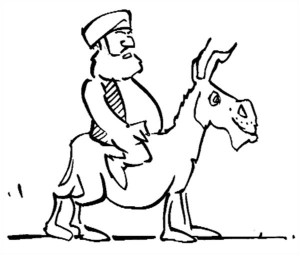
Sir,
The recent rulings by the Council of Islamic Ideology regarding underage girl’s marriage and the first wife’s written permission before a man can take another wife are so controversial that they have become a subject of discussion at all forums.
At this crucial moment of our history, why have they started this new debate? With every passing day, women folk are being subjected to rape, torture, honor killing along with being denied the basic right of education and free movement.
The latest rulings of CII will convey a message to the civilized world as if Islam is a religion which has not given women the respect, honor and dignity that is their fundamental right. That is not true. It is Islam which gave women respect and regard and placed them at a very noble and worthy position and a status equal to men all respects.
Burying girls alive was a common practice before the advent of Islam was strictly forbidden by Islam. Women were denied a share in inheritance in every society and religion. It was Islam that fixed a share for women in property. It is crystal clear that in Islam education is for all Muslims irrespective of their gender. But our so called religious clerics believe in education only for the male segment of the Muslim society. The same goes for selecting a life partner. Men and women have an equal right to select their life partner.
There is no denying the fact that ours is primarily a male dominated society, and at times girls themselves surrender willfully to un-Islamic and unethical traditions prevailing in the present day. The crudest form of this is that the moment a girls ties a knot, she willingly or unwillingly surrenders her identity by changing her surname. Similarly, some girls surrender their right of inheritance in favor of their brothers. These practices cannot be found anywhere in the early history of Islam.
Aamir Aqil,
Lahore.
Ad infinitum
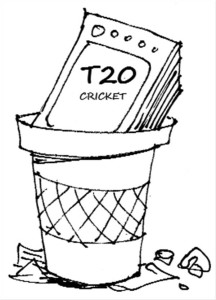
Sir,
The ongoing ICC Twenty20 World Cup in Bangladesh is telecast live by PTV Sports channel, but the sad thing is that it seems like we are watching a marathon of commercials with some parts of the matches in shown in between them.
Most of the times, the first ball of the over is missed because of the advertisements, which start again immediately after last ball of the over, or every time someone gets out.
An Indian sports channel which is showing the same tournament shows a limited number of advertisements.
I will appreciate if the higher authorities in PTV Sports take note of this and advertisements are cut down. I also appeal to Minister for Information and Broadcasting Pervaiz Rashid to look into this matter.
Mubashir Mahmood,
Karachi.
Feast or famine
Sir,
Every Pakistani is well aware of terrorism, unemployment, inflation, injustice, forced labor, disappearances, intolerance towards minorities, discrimination against women, custodial deaths, and torture are the challenges they are facing on a daily basis.
Now there is another challenge for the impoverished Pakistanis: a famine in Sindh. The conditions faced by people living in the desert areas of Tharparkar are life-threatening.
Droughts in the remote desert areas of Pakistan are natural and normal, but the death of so many people is not. It is due to the lack of facilities and irresponsibility of people who are appointed to selected posts that have taken the lives of so many innocent people, most of them children, within a few months. The actual number of deaths could be much higher than is being reported.
The elected representatives of Sindh and Thar have been irresponsible. Now, they are making lame excuses and statements in order to evade responsibility for their criminal neglect. According to a report in the media, the chief minister of Sindh, Syed Qaim Ali Shah, has said many of these deaths are due to disease, not only because of drought or malnutrition.
It is our humble request that our political leaders create a solid strategy to save the lives of these poor people. Attention must be paid to saving their livelihoods on which they depend.
These policies should be made on a long term basis, not for temporary relief.
Fizza Tariq,
Lahore.
Who is to blame?
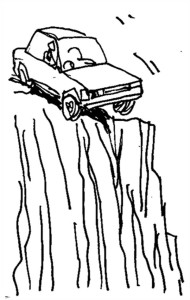
Sir,
I have just seen a TV program where they highlighted how the roads of the city of Karachi are deteriorating. The largest city of the country has got roads full of bumps, they are as good as kutcha, a lot of pot holes, drains are overflowing and dirty water spread on the roads. It must be remembered that stagnant water on the roads is biggest destroyer of the roads. Constantly we heard the commentator saying the department responsible for making and repairing roads is responsible for the neglect. They have a budget to constantly repair and make new roads but the money is embezzled. That may be true, but is it only them who are to blame?
One can also blame the sanitary workers who are not regularly cleaning the drains and when they do, they leave the dirt on the road and slowly it goes to the drain once again and consequently clogging the drains once again. Once I asked one sanitary worker who cleaned up the drains leaving the dirt on the road, he said that the pickup was on its way. They would remove all the dirt. More than a fortnight has passed and the dirt is still there spread all over the road. This is not the case of one city; it is a common occurrence in all the cities. Unfortunately the villages too are rapidly ruining their environment.
Then we have people breaking the roads and make speed breakers on roads in order to slow down the traffic. As the vehicles pass these speed breakers, they slowly erode and consequently the whole road gets ruined. Thus a road made for the benefit of the masses is destroyed by the masses.
The biggest spoilers of the roads are plastic bags. True it is very handy to carry them when shopping but these bags are a menace in the cities as well as villages. If we see overflowing sewers and roads flooded with dirty water, it is because of these bags. They are first used for shopping, then later either thrown away or filled with litter and thrown out. Eventually these bags find their way in the sewers and consequently clog them. The clogged sewers begin to overflow, and this dirty sewage water floods and destroys the roads. In this case too, it is the masses who destroy their own environment and their own infrastructure.
So who is to blame for the condition of our roads? My answer is, everybody. We all need to radically change ourselves. Only then will we see a change in the society.
Abid Habib,
Mirpurkhas.
Namedropping
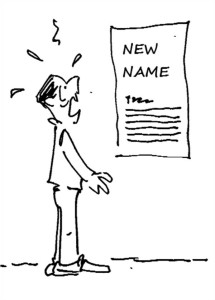
Sir
I live far away from my home city, Lahore. On my latest visit, I was shocked to see that Lawrence Road has been renamed after a prominent journalist. The road was named Lawrence Road as it was to appreciate the services rendered by John Lawrence. He gave us a garden called Lawrence Gardens and also the Lahore Zoo. These sites are great recreation centers for the Lahoris and more importantly act as the lungs of the city. By renaming the road is like distorting the history of the city.
I appreciate the services of the veteran journalist who the road is now named after. He too was a great man but if we have to pay homage to him and to any other great person, then it is highly recommended that a new road or a building be built and named in his memory.
I urge the district government to restore the names of roads especially those named after the people who have rendered great services to this city.
Abdul Rahim,
Karachi.
Sindh at war
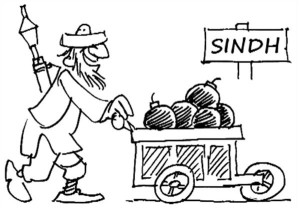
Sir,
The recent attacks on Hindu temples and killings of Ahmadis in interior Sindh must ring bells for Sindhi nationalists. The province which has so far been a peaceful part of Pakistan for minorities is now slowly falling into the hands of exclusivists.
Sindh has been known for its inclusive, humanistic religious and social traditions that evolved as result of a process spread over centuries. People like Lal Shahbaz Qalandar, Sachal Sarmast and Shah Abdul Latif Bhitai immensely contributed towards making the Sindhi society a tolerant one. The Sindhi society never succumbed to any faith based narrative emerging out of the corridors of power in the federal capital.
The new attacks have raised some very fundamental and challenging questions for the forces of Sindhi nationalism blended with Sufism that have long been the custodians of inter religious harmony in Sindh. Are these forces weakening under pressure from systematic state backed radicalization through religious seminaries? What would be the future of Sindhi nationalism which has got its roots in one of the greatest civilizations to ever exist on the face of this planet?
It is an irony that the rulers of Sindh, who have been shrewdly manipulating the slogan of Sindhi nationalism for their own political gains, celebrate the antiquity of Sindh but in real their political approach is more of a kind of political pragmatism plus political populism.
The delicate social balance in the land of Sufis is clearly under an assault from rabid right wing forces. Social changes occur slowly and it is extremely hard to rebalance a society.
Everything is not lost though. A majority of the Sindhis is still open minded and tolerant but the question is, is it united to check the advancing menace of faith based narrative of nationalism? The Sindh government must make sure that it is countering the exclusivist narrative through its education system. It must assert itself in all religious seminaries by introducing a blend of Sindhi Sufism and history based cultural nationalism. It should also introduce philosophy as compulsory subject in high school and all through to Masters level. Conferences may be organized regularly to educate newer generations of Sindhis about their rich cultural heritage. The role of Sindhi media is vital in propagating tolerance.
Sindh is standing at a cross roads. It must decide whether it wants to preserve its Sindhi identity or would succumb to the rising monster of exhibitionist religiosity.
Atif Mahmood Majoka,
Melbourne.

